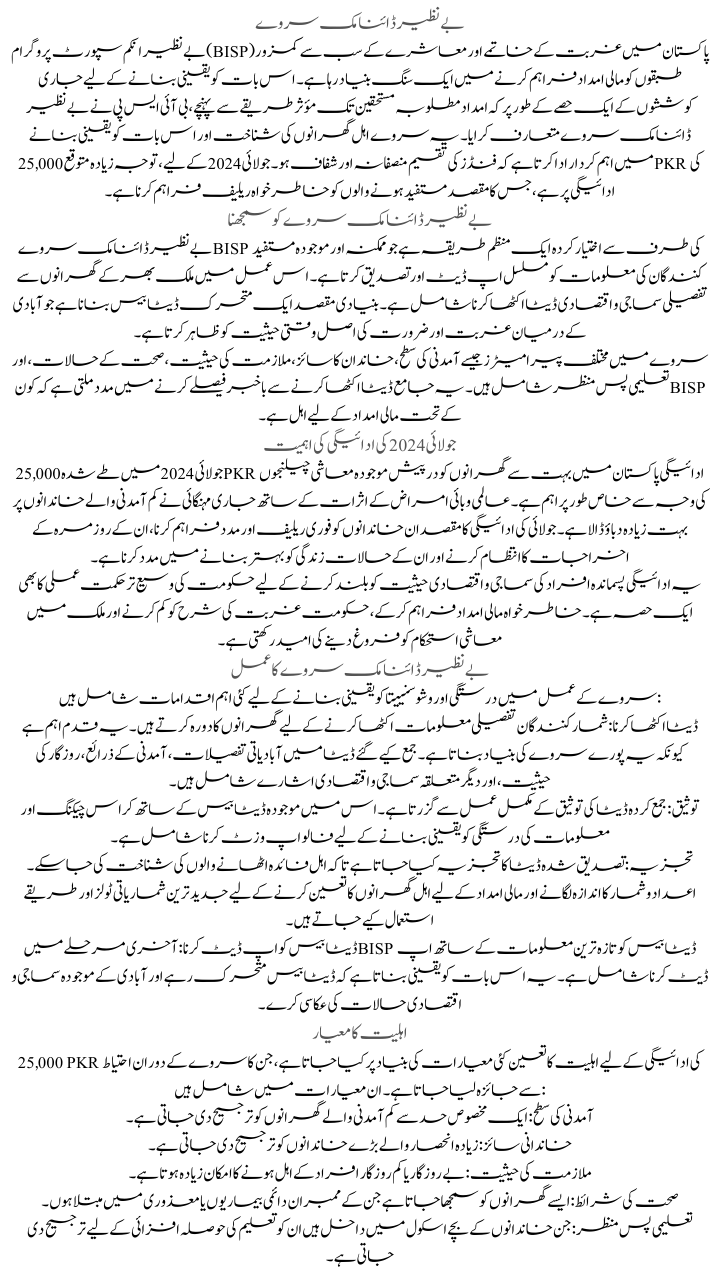Benazir Dynamic Survey
The Benazir Income Support Programme (BISP) has been a cornerstone in alleviating poverty and providing financial aid to the most vulnerable segments of society in Pakistan. As part of its ongoing efforts to ensure that the aid reaches the intended beneficiaries effectively, BISP introduced the Benazir Dynamic Survey. This survey plays a crucial role in identifying eligible households and ensuring that the distribution of funds is both fair and transparent. For July 2024, the focus is on the much-anticipated 25,000 PKR payment, aimed at providing substantial relief to the beneficiaries.
Understanding the Benazir Dynamic Survey
The Benazir Dynamic Survey is a systematic approach adopted by BISP to continuously update and validate the information of potential and current beneficiaries. This process involves collecting detailed socio-economic data from households across the country. The primary goal is to create a dynamic database that reflects the real-time status of poverty and neediness among the population.
The survey includes various parameters such as income levels, family size, employment status, health conditions, and educational backgrounds. This comprehensive data collection helps in making informed decisions about who qualifies for financial assistance under the BISP.
Importance of the July 2024 Payment
The 25,000 PKR payment scheduled for July 2024 is particularly significant due to the current economic challenges faced by many households in Pakistan. The ongoing inflation, coupled with the impacts of the global pandemic, has put immense pressure on low-income families. The July payment aims to provide immediate relief and support to these families, helping them manage their daily expenses and improve their living conditions.
This payment is also a part of the government’s broader strategy to uplift the socio-economic status of the underprivileged. By providing substantial financial aid, the government hopes to reduce poverty rates and promote economic stability in the country.
Process of the Benazir Dynamic Survey
The survey process involves several key steps to ensure accuracy and reliability:
- Data Collection: Enumerators visit households to gather detailed information. This step is crucial as it forms the basis of the entire survey. The data collected includes demographic details, income sources, employment status, and other relevant socio-economic indicators.
- Verification: The collected data undergoes a thorough verification process. This includes cross-checking with existing databases and conducting follow-up visits to ensure the information’s accuracy.
- Analysis: The verified data is then analyzed to identify eligible beneficiaries. Advanced statistical tools and methods are used to assess the data and determine the households that qualify for the financial aid.
- Updating the Database: The final step involves updating the BISP database with the latest information. This ensures that the database remains dynamic and reflects the current socio-economic conditions of the population.
Criteria for Eligibility
Eligibility for the 25,000 PKR payment is determined based on several criteria, which are meticulously evaluated during the survey. These criteria include:
- Income Level: Households with income below a certain threshold are prioritized.
- Family Size: Larger families with more dependents are given preference.
- Employment Status: Unemployed or underemployed individuals are more likely to qualify.
- Health Conditions: Households with members suffering from chronic illnesses or disabilities are considered.
- Educational Background: Families with children enrolled in school are prioritized to encourage education.

Impact of the Benazir Dynamic Survey
The impact of the Benazir Dynamic Survey extends beyond the immediate financial assistance provided through the 25,000 PKR payment. By continuously updating and refining the database, BISP ensures that the aid reaches those who need it the most. This dynamic approach helps in addressing the evolving socio-economic conditions and allows for timely intervention.
Moreover, the survey data provides valuable insights for policymakers. It helps in identifying trends and patterns in poverty, which can inform future policies and programs aimed at poverty alleviation. The survey also fosters transparency and accountability in the distribution of funds, thereby enhancing public trust in the program.
Challenges and Future Directions
While the Benazir Dynamic Survey is a robust mechanism for identifying and assisting the needy, it is not without challenges. Some of the key challenges include:
- Data Accuracy: Ensuring the accuracy of the collected data is a significant challenge. Enumerators must be well-trained, and the verification process needs to be stringent.
- Reach: Accessing remote and underserved areas can be difficult, which may lead to some eligible households being missed.
- Resource Constraints: Conducting a comprehensive survey requires substantial resources, including funding, manpower, and technology.
To address these challenges, BISP is continuously working on improving its processes. Future directions include leveraging technology for data collection and analysis, expanding outreach efforts, and enhancing collaboration with other government and non-governmental organizations.
Conclusion
The Benazir Dynamic Survey is a critical component of the BISP, ensuring that financial aid reaches the most deserving households. The 25,000 PKR payment for July 2024 is a testament to the government’s commitment to supporting the underprivileged during challenging times. By adopting a dynamic and data-driven approach, BISP aims to create a more equitable and inclusive society. As the program evolves, it promises to bring about significant positive changes in the lives of millions of Pakistanis, helping them overcome poverty and build a better future.
